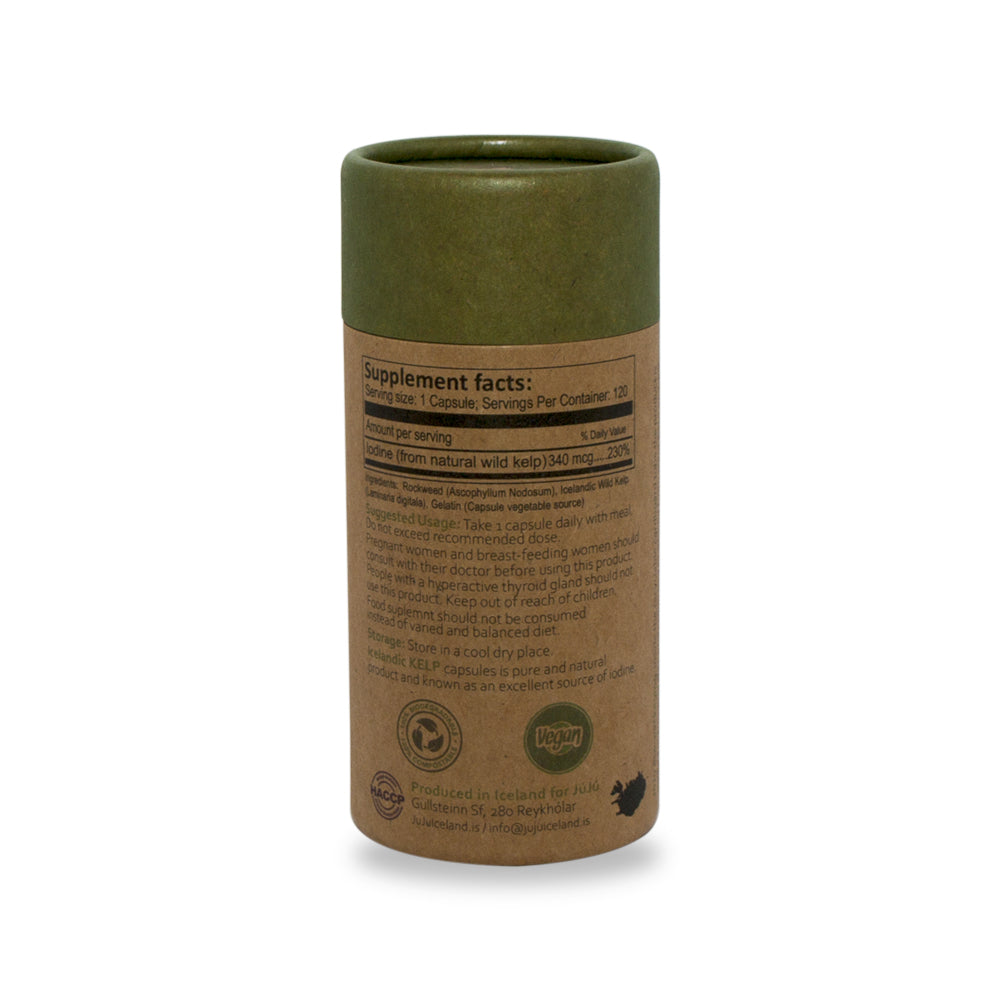- Sku:
- Vendor: JúJú
JúJú Kelp Seaweed Capsules (120 capsules)
What is JúJú KELP
You already know how to eat your daily servings of vegetables, but when was the last time you thought about your sea vegetables? Kelp, a type of seaweed, is chock full of good-for-you nutrients that can benefit your health and possibly even prevent disease.
Already a staple in many Asian cuisines, this sea algae is a natural source of essential vitamins, minerals, and antioxidants.
Weight: 80 grams
Description
It is best known for its Iodine values, one of the highest levels of any plant material. Other elements include Potassium, Calcium, Iron, Vitamins E (alpha-tocopherols) and C, Amino Acids, enzymes, and more.
Kelp, or brown algae, is harvested on the west coasts of Iceland. Kelp can have many therapeutic and nutritional benefits, as it is a rich source of iodine, minerals, antioxidants, fiber, proteins, and healthy carbohydrates. Kelp also reduces inflammation, fights diabetes, and protects the heart and brain.
- Kelp is an excellent iodine, potassium, magnesium, iron, and calcium source.
- Depending on the type of kelp or seaweed, the nutrient profile can vary greatly.
- Laminarin is a specific type of kelp in the brown algae family rich in nutrients (iodine, potassium, magnesium, calcium, and iron).
- Another type of seaweed — Gracilaria changii — is rich in fiber content and essential amino acids (the building blocks of proteins).
- Kelp also contains a complex long-chain carbohydrate (polysaccharide) called fucoidan. Fucoidan in kelp is antioxidant and anti-inflammatory properties, for example.
- Kelp is also an excellent source of vanadium, used in clinical studies to lower glucose levels in individuals suffering from diabetes type 1 and 2. Fucoxanthin, a pigment found in brown seaweed, also may boost weight loss.
Kelp can improve Iodine Deficiency.
- Iodine deficiency is the leading cause of low thyroid hormone levels. Deficiency during pregnancy can lead to severe mental and cognitive development issues in children. It can impair reproductive function or cause brain damage or permanent intellectual disability during childhood.
- Kelp has a high iodine content (200 to 400µg ). It may improve thyroid function in a study (longitudinal) of 7 patients with severe motor and intellectual disabilities and hypothyroidism due to iodine deficiency. Patients were given 1 to 2 grams of powdered kelp daily, and this treatment restored thyroid function, increasing the concentration of iodine in the urine.
Kelp may boost weight loss.
- A study of Xanthigen, a type of kelp, showed reduced body weight, waist circumference, and body and liver fat content in 151 non-diabetic obese women (DBRCT). In this study, 75% had a non-alcoholic fatty liver disease, and 25% had a normal liver). It also improved liver function tests and increased energy use at rest.
- Mice fed fats from seaweed had increased markers of weight loss in fat tissue. Fucoxanthin, a pigment from seaweed, produced these effects.
- In a cell study, alginate (a carbohydrate present in the walls of algae and seaweed) reduced the activity of a protein in the pancreas that breaks down fats (pancreatic lipase). Lower activity reduces fat breakdown, leading to fewer fats absorbed after meals.
Kelp Is an Antioxidant
- The antioxidant properties of fucoidan (from kelp) were confirmed in a cell study that tested its two major components, sulfate and fucose. Fucoidan showed antioxidant effects and has the potential to be used as a natural antioxidant.






JúJú Kelp Seaweed Capsules (120 capsules)







